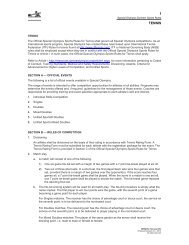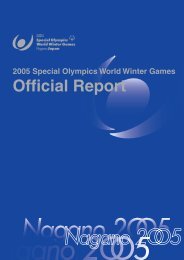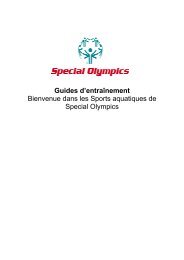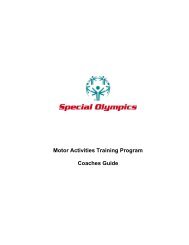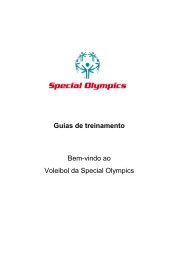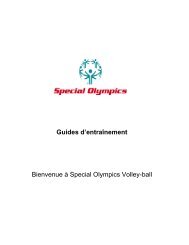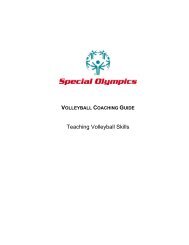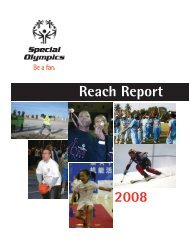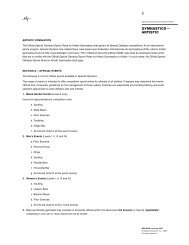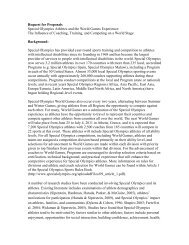BADMINTON Special Olympics Sports Skills Program
BADMINTON Special Olympics Sports Skills Program
BADMINTON Special Olympics Sports Skills Program
You also want an ePaper? Increase the reach of your titles
YUMPU automatically turns print PDFs into web optimized ePapers that Google loves.
Taking Athletes to a Competition<br />
There should be a great deal of excitement as your athletes<br />
get ready for the actual competition. This should be a fun<br />
time for all involved, but take care to prepare your athletes<br />
for the competition event by enacting the following plan.<br />
1. Planning Ahead<br />
• Clearly inform athletes and parents of the date and<br />
location of the event.<br />
• Build excitement for the event and focus the practices<br />
on the competition.<br />
• Organize transportation to and from the event.<br />
• Prepare a checklist for athletes and for coaches:<br />
• Examples for athletes: badminton racket, water bottle,<br />
sweat towel, snacks, sweat suits.<br />
• Examples for coaches: registration materials, medical<br />
forms, emergency phone numbers, list of participants<br />
and phone numbers, broken string repair kit, first-aid kit.<br />
2. What to Do at the Competition Site<br />
• Check in with badminton site coordinator.<br />
• Take off court warm-up similar to practice.<br />
• Have athletes stretch just as if they were at their own<br />
practice session.<br />
• Take warm-up on court (10-15 min.).<br />
• Follow directions of the badminton coordinator for court<br />
assignment.<br />
• Compete according to SOI badminton rules.<br />
• Watch athletes compete and offer encouragement and<br />
praise winning shots.<br />
• Make sure athletes shake opponent’s hand after<br />
competition and display good sportsmanship—win or lose.<br />
• Participate in awards presentation following the<br />
conclusion of all matches.<br />
• Make a point of saying something positive and concrete<br />
to each athlete before they leave.<br />
• Thank the parents and helpers who came to watch.<br />
• Announce the time and location of the next practice.<br />
3. Follow-Up<br />
• Record the results of your individual team members.<br />
• Evaluate their performance.<br />
• Inform parents of athletes’results.<br />
• Identify practice plan ideas to help athletes improve.<br />
• Set realistic goals for next competition based on<br />
performance.<br />
<strong>Special</strong> <strong>Olympics</strong> Badminton <strong>Sports</strong> <strong>Skills</strong> <strong>Program</strong><br />
Divisioning in <strong>Special</strong> <strong>Olympics</strong><br />
In <strong>Special</strong> <strong>Olympics</strong>, every athlete must have a reasonable<br />
chance to win. Whenever possible, athletes are divided into<br />
age groups and segregated by sex. However, that is n o t<br />
a lways possibl e .<br />
The following order has been shown to be effective for<br />
divisioning in this sport:<br />
Age Divisions<br />
Individual <strong>Sports</strong><br />
Youth: 8-11<br />
Junior: 12-15<br />
Senior: 16-21<br />
Masters: 22-29<br />
Senior Masters: 30+<br />
Team <strong>Sports</strong><br />
Junior: 15 and under<br />
Senior: 16-21<br />
Masters: 22+<br />
Managing a Small Competition<br />
Since badminton is a new sport in the <strong>Special</strong> <strong>Olympics</strong><br />
family, it may be difficult to schedule a high volume of<br />
competitions for your athletes to attend. Therefore, it may<br />
be necessary for coaches to organize and develop local<br />
competitions with invited teams and/or teams created from<br />
the local athletes. The following guidelines are suggestions<br />
for running a local competition.<br />
Volunteers and Officials<br />
If possible, recruit volunteers with basic understanding of<br />
badminton rules and scoring.<br />
Competition Director<br />
Responsible for the overall organization of the event.<br />
Serves as the final say on all protests. Recruits the teams<br />
to participate and sets the format.<br />
Registrar<br />
Responsible for on-site check in; keeps results and organized<br />
medals.<br />
Individual <strong>Skills</strong> Test Officials<br />
1. Group leader – Keeps the group together, rotates with the<br />
group to the next station, and records scores.<br />
2. Station leader – Describes skill to be tested and runs the<br />
station. Awards points and makes judgment calls.<br />
4 9



